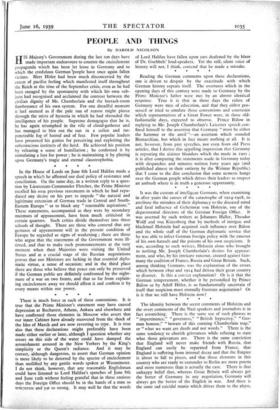There is much force in each of these contentions. It
is true that the Prime Minister's statement may have caused depression at Bucharest, Athens, Ankara and elsewhere and have confirmed those elements in Moscow who assert that our inner Cabinet have already recovered from the shock of the Ides of March and are now reverting to type. It is true also that these declarations might preferably have been made either earlier or later, although I question whether any errors on this side of the water could have damped the astonishment aroused in the New Yorkers by the King's simplicity or the Queen's radiance. And it may be correct, although dangerous, to assert that German opinion is more likely to be deterred by the spectre of encirclement than mollified by any gentle words spoken at Westminster. I do not think, however, that any reasonable Englishman could have listened to Lord Halifax's speeches of June 8th and June 12th without feeling grateful that in these anxious days the Foreign Office should be in the bands of a man so temperate and yat so strong. It may well be that the words of Lord Halifax have fallen upon ears deafened by the blare of Dr. Goebbels' loud-speakers. Yet the still, silent voice of history will not, I think, contend that he made a mistake.






















































 Previous page
Previous page